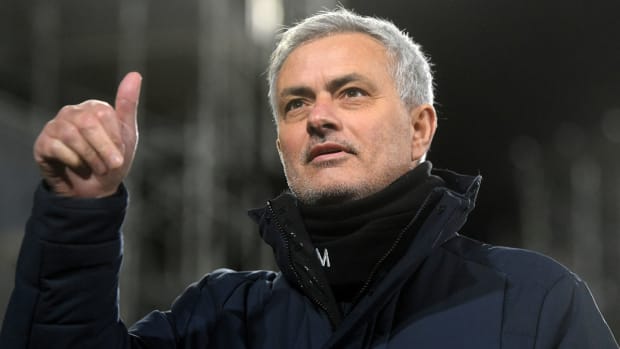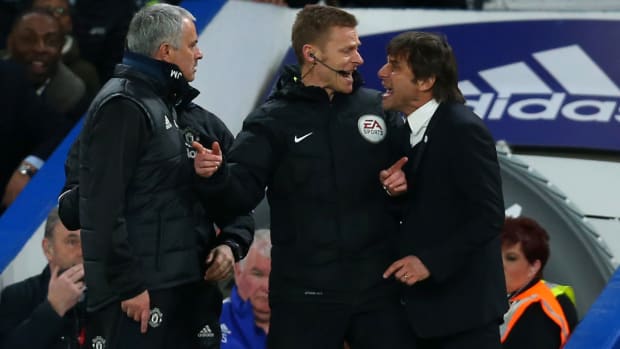Mourinho moved quickly after being axed by Tottenham, and rekindling a rivalry with Antonio Conte will draw eyeballs, but will what he has left to offer help Roma?
When José Mourinho was at his most successful, it was because of his pragmatism, and while that side of his personality may be increasingly difficult to discern in his coaching, it remains at least in his choice of career path. Now that the very biggest clubs are beyond him, it makes sense to pursue those clubs one layer below the very elite. Others may have been too proud, may have held out for better, but not Mourinho. And so, after Tottenham Hotspur follows Roma.
U.S. businessman Dan Friedkin bought the club from another American, James Pallotta, last August, and although the new ownership kept Paulo Fonseca on as coach, the sense all season was that he was likely to be replaced this summer. Fonseca met with directors on Monday, and his departure was announced on Tuesday morning, just a few hours before it was revealed that Mourinho had signed a three-year contract.
It is a decision that, on the face of it, makes little footballing sense. Serie A is a different world to the Premier League, and it may be that Mourinho’s low block can succeed there, but he is a very different type of manager to Fonseca, who preferred a modern, high-pressing game.
“A great champion who has won trophies at every level, José will provide tremendous leadership and experience to our ambitious project,” the club wrote in a statement. “The appointment of José is a huge step in building a long-term and consistent winning culture throughout the club.”
That sounds a lot like what a club president would have said a decade ago. But Mourinho hasn’t won a league title since 2015—since when he won one League Cup and one Europa League. Mourinho did win trophies, but he hasn’t recently. The idea that he’s a born winner—whatever that means—nonetheless remains, as though success were somehow a personality trait, rather than something that has to be worked for, something that requires constant adaptation to the changing demands of the game.
Mourinho has always been a difficult personality, somebody players would often tire of, somebody who has repeatedly been accused of looking after himself rather than the needs of the club. The cycle of initial boost, followed increasingly rapidly by disillusionment and acrimony is familiar. Modern players seem not to respond to him in the way they did 15 or so years ago.

In part that is simply an issue of time. Customs and habits change: One generation is not the same as the last. But it’s also about how Mourinho has changed. He was always on the side of chaos, a dark charmer prepared to do what was necessary to win, but missing out on the Barcelona job in 2008 seemed to change him. Suddenly he became the anti–Pep Guardiola. If Guardiola played a high line, then Mourinho sat deep; if Guardiola played with the ball, then he played without it. Repeatedly at Tottenham this season advantageous positions were squandered as he had his side drop deeper and deeper, inviting pressure as though to make a point that the old ways could still function in the modern game. They could not—or at least not the way they were executed by Spurs.
Mourinho inherits a Roma squad perhaps most kindly described as experienced. Chris Smalling and Henrikh Mkhitaryan played for him, not especially happily, at Manchester United. Pedro played for him at Chelsea. Then there’s Davide Santon, Stephan El Shaarawy, Javier Pastore and Edin Džeko, the sort of veterans who might perhaps respond to Mourinho’s one-last-mission shtick.

But the most obvious narrative will be his battle with Antonio Conte, who has just led Inter to the scudetto for the first time since Mourinho was in charge in 2010. Conte replaced Mourinho after his second stint at Chelsea (following the Guus Hiddink caretaker interregnum) and made little secret of his disdain for his predecessor with whom he repeatedly exchanged barbs after Mourinho had moved to Man United.
Realistically, though, Roma will not be challenging Inter anytime soon. At the moment, 27 points and six places separate the sides, and unless Mourinho enjoys an extraordinary Indian summer to his career, that gap will not come close to being closed next season. This feels like a defining job for Mourinho. He is only 58, but already this seems like a final chance at redemption. If he fails here, where next? One of the not-quite-elite in Spain, like a Sevilla or a Valencia? Or back to Portugal, perhaps? Maybe a national team?
From Roma’s point of view, appointing Mourinho will bring attention; whether it brings success is another matter entirely.
More Soccer Coverage: